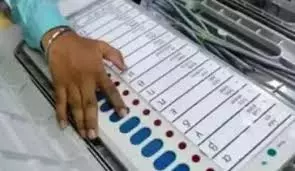
The dispute over payment of power dues between Telangana and Andhra Pradesh has been pending for a long time. File
| Photo Credit: Reuters
Recently, the Telangana High Court quashed the Centre’s order directing the State government to pay around ₹6,750 crore power dues to Andhra Pradesh, which has come as a major relief to the administration.
A batch of writ petitions were filed challenging the Union government’s order of August 29, 2022. The High Court gave liberty to the parties (the two State governments) to take recourse to remedy available in law.
The dispute over payment of power dues between the two States has been pending for a long time. The Andhra Pradesh government argued that Telangana should pay ₹3,441.78 crore in principal and ₹3,315.14 crore late payment surcharge for the power supplied to it post bifurcation. The Telangana government, on its part, has been claiming that its power utilities should get around ₹17,828 crore from the neighbouring State.
The Telangana government presented papers in support of its contention during a virtual meeting convened by the Union Home Ministry. It started that the total receivables from Andhra Pradesh power utilities was ₹17,420 crore, while dues payable to APGENCO were to the tune of ₹4,887 crore, which left a balance of ₹12,532 crore receivable by Telangana. The State government even made a provision to this effect in the budget.
The issue took a serious turn when the Andhra Pradesh government approached the Union Power Ministry. The Union Power Minister, R.K. Singh, said on the floor of the Rajya Sabha that the Centre had directed the Andhra Pradesh government to supply electricity to Telangana post bifurcation. Telangana made payments for the power supplied for some time, but stopped later. When Telangana was directed to make the payment of dues, it went to court. The court gave a stay which expired, he said. The Minister asserted that the Andhra Pradesh Reorganisation Act, 2014 contained a provision which empowered the Centre to enforce its directions. The Union Power Ministry was in consultation with the Union Finance Ministry for giving a direction to the Reserve Bank of India so that “the accounts of the Government of Telangana can be deducted by that amount which is to be paid to the Government of Andhra Pradesh”.
Mr. Singh’s claim drew flak from the Telangana government which asked why the Centre remained silent on several issues that have been awaiting resolution since bifurcation if it had the power to intervene. The Centre did intervene in certain matters and give directions, but a majority of the issues remained unresolved, said senior officials.
The issue of power dues between the two States had figured during the bilateral meetings convened by the Union Home Ministry as well as in the meetings of the Southern Zonal Council held under the chairmanship of the Union Home Minister. The Telangana government was firm in its stand that it was always willing to settle the issue, but wanted the dues receivable by it to be taken into consideration.
The Andhra Pradesh power utilities approached the National Company Law Tribunal and subsequently filed a writ petition in the Telangana High Court. They maintained that power was supplied as per the directions of the Central government till June 2017 for which Telangana Discoms made part payment to APGENCO. In response, the Telangana government asserted that it was open for settlement if Andhra Pradesh was willing to do so out of court, but reiterated that partial settlement of the issue was not acceptable.
Telangana power utilities complained that there were many instances of Andhra Pradesh power utilities taking decisions detrimental to the interests of Telangana without acting on the advice of the southern regional load dispatch centre. They contended that the claims made by Andhra Pradesh utilities during the meetings with the Government of India that they acted on the directives of the Union governmen, were not correct. The Andhra Pradesh power utilities were not considering requests to settle disputes related to power dues at the State level and were doing “forum shopping” so that they were not settled, the Telangana government claimed.
It remains to be seen whether the two States will opt for mediation to settle the power dues. If this happens, it could be a major step towards resolving other pending bifurcation issues. The 10-year deadline, which was fixed by the Andhra Pradesh Reorganisation Act for settling issues, ends less than a year from now.






